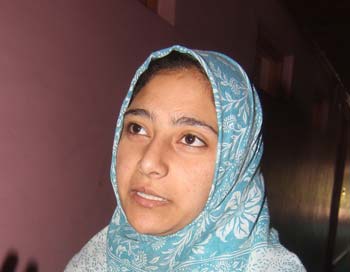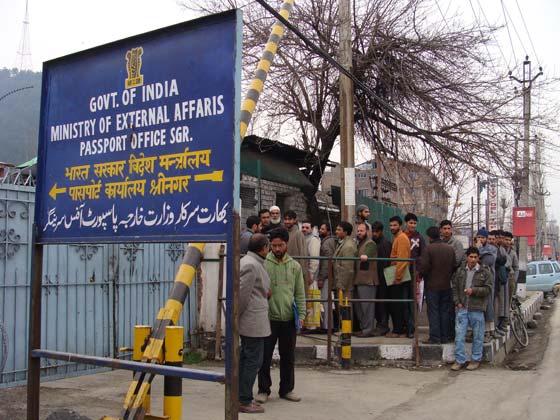Though fundamental to the life in civilized world, the passport has become a rare document for the Muslims living in India’s Muslim majority state. As the government is increasing control barely on basis of what somebody’s relations have done or are doing, the policy has created problems that could retard the process of reconciliation, reports R S Gull.
Kashmir is passing through interesting times. Now media mounts campaigns for the whole day or a week when somebody is denied a travel document. The merits of the decision are debated live on the newsprint and through OB vans. At the end of it, comes the tweet from Chief Omar Abdullah and then the applicants get passport. It happened twice last week.
It was the case of so-called JKLF activist Bashir Ahmad Bhawani’s engineer son Mehraj-ul-Asrar. An alumunus of NIIT Srinagar, Mehraj got a job in an American firm. The selection took place in campus following which he proceeded with the process of seeking the travel documents. As his date for departure was round the corner and there was no passport in sight, a frustrated engineer came out. Media was willing to pick the copy. At the end of it the government came out with the statement that his file has been cleared.
While Bhawani junior was waiting for the postman, another case was already in air. Picking up the last week’s Kashmir Life copy about Suafira, the tenth standard orphan from Budgam, who won a US scholarship but was denied a passport, the media was up and unstoppable. This story was serious slap on the working of the systems in place. The girl was already in the orphanage when her father passed away. Then, she was four year old. For all these years, she lived in the orphanage in city outskirts. After she secured the honour, she came to know that her uncle was a militant. Interestingly, Farooq, her uncle became a militant earlier and surrendered in 1995, two years before Sufaira was born on October 30, 1997!
Police reports jumbled all the details they had about the Beerwa family only to suggest that she does not deserve the document. It happened at a time when the girl-specific orphanage was looking at Sufaira to be the inspiration for the other 110 inmates. As all these details came into fore, Omar was left with no option but to tweet that things are progressing. By now when the girl has already her passport, it remains to be seen if she can still catch her flight to US or not.
Given the two cases, it seems, it needs a massive campaign to force the system to yield on this basic human requirement – right to travel, something that is fundamental to life in the civilized world. This negates the intervention that Chief Minister Omar Abdullah claimed he made as early as August 2009 when he asked the police (intelligence wing) to stop holding A responsible for something that B did. Then, it was told that a serious review process has been set in motion and people will be denied travel documents only in extreme cases. The intervention had come after detailed discussions were held at various levels with the central government and within J&K that the government should not stop relatives of militants or separatists from travelling abroad.
But the last week only proved that Kashmir has not moved a single step from where it earlier was. The issue becomes chronic during Haj season when people are being stopped at the last moment because some relation of them had been involved with militancy or any of the Hurriyat constituents. Police continues to update and use the indexing and have a black list of families which are denied this basic right. In 2007, members of 60000 families in Kashmir under watch as they were in security blacklist. Since then, the numbers might have urged a bit more.
Every country has its blacklist but not all countries prevent the basics to them. The so called Pakistan occupied Kashmir is an instance not far away. Split from J&K in 1947 wars between India and Pakistan, it is being referred as backward, poor and under-privileged. But the policy makers and state preachers ignore a larger point. When Islamabad decided to have Mangla dam in Mirpur, the project displaced thousands of people. A liberal passport regime helped most of the population to immigrate to UK that was rebuilding from the ravages of war. Half a century later, Mirpur has its replica in Birmingham. It is a Kashmir town in UK. It has its representation in house of commons. The belt has world class exposure. People who have visited the PaK and interacted with the well-read believe this one-third of erstwhile Kashmir state might have more Oxford read population that Kashmir can ever aspire to have!
Delhi and Srinagar must start thinking of how the idea of democracy can be made a sellable package to Kashmir. Elections are just the first step of the idea of democracy.
The situation becomes quite critical when such policies end up having massive collateral damage. There are countless cases in which the career of the young students and professionals was marred. Some of them had to take the legal recourse to get their rights.
It was in April last when we heard the inspirational story of a Bandipore scholar Ashiq Hussain. A resident of Papchan, Ashiq landed for PhD in Baba Atomic Research Centre (BARC) Mumbai after completing his masters from Kashmir University and M Phil from Pondicherry University. On basis of his academic record, he got an opportunity to have research in Italy’s Abdus Salam International Centre for Theoretical Physics (ICTP), the facility that was named after Pakistan’s lone noble laurite. But he needed a passport and the government was unwilling to offer him one.
The reason that he was officially given was that his brother was involved in subversive activities. According to Aashiq’s lawyer Mir Shafqat Hussain Ashiq’s brother was absolved of all the charges by the court as the prosecution could not prove any of the charges they had concocted. But it did not stop police from denying him a passport. Ashiq finally approached the court.
These are not problems getting created unwittingly. Policy makers are aware of their targets. In 2004, for instance, Srinagar decided against permitting Kashmiri students to study in Pakistan. The reason was that some of the Hurriyat leaders were recommending youth to various professional courses in Pakistani institutions where they exercised some influence. It created a situation that for all the passports being issued in select cases, there was a disclaimer: “This passport is valid for all countries except Pakistan”.
Within the SAARC space, the member countries are exchanging students for many years. Even Srinagar has a number of students from across in university of Kashmir under this exchange quota. But at one point of time two Kashmiri students were denied passport to study in Pakistan even after they secured South Asia Foundation run Madanjeet Singh Arts Scholarship.
Careers apart, the denial of passport played with the lives of people. May 13, 2008 is a watershed day in the history of state-monopolized travel. That day, a couple living on either side of the LoC divorced after waiting for 18 years.
 It involved Sheeri villages Haneefa and Fareed who had married in 1988, the amorphous era of the militancy. The happy days of the couple ended the day, Fareed decided to go for arms training to PaK in 1990 leaving behind his 15 days daughter. He never returned. Initially, Haneefa would file an application for passport and it would get rejected. After the trans-LoC bus was started, she filed applications seven times. But every time, the request was rejected because her husband had gone for becoming a militant. This was despite the fact that she belonged to a divided family. By then, she was separated for 18 years. Interestingly, all the members of her in-law family were permitted to go to the other side but not Haneefa.
It involved Sheeri villages Haneefa and Fareed who had married in 1988, the amorphous era of the militancy. The happy days of the couple ended the day, Fareed decided to go for arms training to PaK in 1990 leaving behind his 15 days daughter. He never returned. Initially, Haneefa would file an application for passport and it would get rejected. After the trans-LoC bus was started, she filed applications seven times. But every time, the request was rejected because her husband had gone for becoming a militant. This was despite the fact that she belonged to a divided family. By then, she was separated for 18 years. Interestingly, all the members of her in-law family were permitted to go to the other side but not Haneefa.
The most tragic part of her story was that her daughter Naheed and her mother-in-law succeeded to get passports and visited Farid in PaK in 2006 where he runs a clothes shop in Muzaffarabad. She decided against returning home. This was a bigger shock that robotic system could neither understand nor react to. Finally, her husband sent her the divorce. This poor woman had already lost her brother Abdul Rashid Bhat in custody. Apprehensive that he may get killed, Rashid’s another brother Majid crossed over and never returned. In absence of any support Haneefa was collecting firewood and selling it – a laborious job that usually men do in the jungles.
Conservative estimates suggest there might be 200 such couples living on either side of the divide who have been denied travel documents for reunion. In 2007, Niaz Mohammad came aboard trans-LoC bus to meet her 70 years old wife Barkat in Poonch for the first time in 42 years. It was 1965 war that separated the two.
















